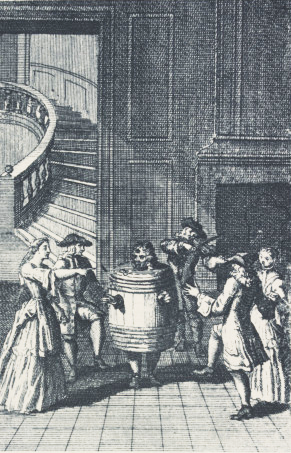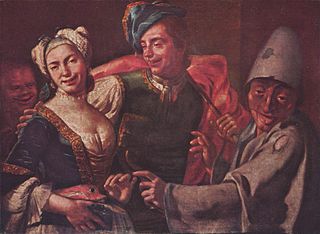Related Research Articles

Aphra Behn was an English playwright, poet, prose writer and translator from the Restoration era. As one of the first English women to earn her living by her writing, she broke cultural barriers and served as a literary role model for later generations of women authors. Rising from obscurity, she came to the notice of Charles II, who employed her as a spy in Antwerp. Upon her return to London and a probable brief stay in debtors' prison, she began writing for the stage. She belonged to a coterie of poets and famous libertines such as John Wilmot, Lord Rochester. Behn wrote under the pastoral pseudonym Astrea. During the turbulent political times of the Exclusion Crisis, she wrote an epilogue and prologue that brought her legal trouble; she thereafter devoted most of her writing to prose genres and translations. A staunch supporter of the Stuart line, Behn declined an invitation from Bishop Burnet to write a welcoming poem to the new king William III. She died shortly after.

"Restoration comedy" is English comedy written and performed in the Restoration period of 1660–1710. Comedy of manners is used as a synonym for this. After public stage performances were banned for 18 years by the Puritan regime, reopening of the theatres in 1660 marked a renaissance of English drama. Sexually explicit language was encouraged by King Charles II (1660–1685) personally and by the rakish style of his court. Historian George Norman Clark argues:
The best-known fact about the Restoration drama is that it is immoral. The dramatists did not criticize the accepted morality about gambling, drink, love, and pleasure generally, or try, like the dramatists of our own time, to work out their own view of character and conduct. What they did was, according to their respective inclinations, to mock at all restraints. Some were gross, others delicately improper.... The dramatists did not merely say anything they liked: they also intended to glory in it and to shock those who did not like it.

Eleanor Gwyn was an English stage actress and celebrity figure of the Restoration period. Praised by Samuel Pepys for her comic performances as one of the first actresses on the English stage, she became best known for being a long-time mistress of King Charles II of England.

The City-Heiress, or, Sir Timothy Treat-all is a play by Aphra Behn first performed in 1682. The play, a Restoration comedy, reflects Behn's own highly Royalist political point of view.

The Rover or The Banish'd Cavaliers is a play in two parts that is written by the English author Aphra Behn. It is a revision of Thomas Killigrew's play Thomaso, or The Wanderer (1664), and features multiple plot lines, dealing with the amorous adventures of a group of Englishmen and women in Naples at Carnival time. According to Restoration poet John Dryden, it "lacks the manly vitality of Killigrew's play, but shows greater refinement of expression." The play stood for three centuries as "Behn's most popular and most respected play."

Oroonoko: or, the Royal Slave is a work of prose fiction by Aphra Behn (1640–1689), published in 1688 by William Canning and reissued with two other fictions later that year. It was also adapted into a play. The eponymous hero is an African prince from Coramantien who is tricked into slavery and sold to European colonists in Surinam where he meets the narrator. Behn's text is a first-person account of Oroonoko's life, love, rebellion, and execution.

Thomas Killigrew was an English dramatist and theatre manager. He was a witty, dissolute figure at the court of King Charles II of England.

Restoration literature is the English literature written during the historical period commonly referred to as the English Restoration (1660–1689), which corresponds to the last years of Stuart reign in England, Scotland, Wales, and Ireland. In general, the term is used to denote roughly homogenous styles of literature that centre on a celebration of or reaction to the restored court of Charles II. It is a literature that includes extremes, for it encompasses both Paradise Lost and the Earl of Rochester's Sodom, the high-spirited sexual comedy of The Country Wife and the moral wisdom of The Pilgrim's Progress. It saw Locke's Treatises of Government, the founding of the Royal Society, the experiments and holy meditations of Robert Boyle, the hysterical attacks on theatres from Jeremy Collier, and the pioneering of literary criticism from John Dryden and John Dennis. The period witnessed news becoming a commodity, the essay developing into a periodical art form, and the beginnings of textual criticism.

Margaret Hughes, also Peg Hughes or Margaret Hewes, was an English actress who is often credited as the first professional actress on the English stage, as a result of her appearance on 8 December 1660. Hughes was the mistress of the English Civil War general Prince Rupert of the Rhine.

The Duke's Company was a theatre company chartered by King Charles II at the start of the Restoration era, 1660. Sir William Davenant was manager of the company under the patronage of Prince James, Duke of York. During that period, theatres began to flourish again after they had been closed from the restrictions throughout the English Civil War and the Interregnum. The Duke's Company existed from 1660 to 1682, when it merged with the King's Company to form the United Company.
The Parson's Wedding is a Caroline era stage play, a comedy written by Thomas Killigrew. Often regarded as the author's best play, the drama has sometimes been considered an anticipation of Restoration comedy, written a generation before the Restoration; "its general tone foreshadows the comedy of the Restoration from which the play is in many respects indistinguishable."
Mary Knep, also Knepp, Nepp, Knip, or Knipp, was an English actress and one of the first generation of female performers to appear on the public stage during the Restoration era.
Anne Marshall, also Mrs. Anne Quin, was a leading English actress of the Restoration era, one of the first generation of women performers to appear on the public stage in England.
Rebecca Marshall was a noted English actress of the Restoration era, one of the first generation of women performers on the public stage in Britain. She was the younger sister of Anne Marshall, another prominent actress of the period.
Katherine Corey was an English actress of the Restoration era, one of the first generation of female performers to appear on the public stage in Britain. Corey played with the King's Company and the United Company, and had one of the longest careers of any actress in her generation. In "The humble petition of Katherine Corey", she stated that she "was the first and is the last of all the actresses that were constituted by King Charles the Second at His Restauration."

The Feign'd Curtizans, or, A Nights Intrigue is a 1679 comedic stage play by the English author Aphra Behn. Behn dedicated the play, originally performed at the Duke's Company in London, to the well-known actress and mistress of King Charles II, Nell Gwyn.
Anne Shadwell was an English stage actor of the seventeenth century. She was one of the first English actresses to appear on stage following the Restoration She was one of six actors recruited in 1660 by William Davenant for the new Duke's Company, acting under her maiden name Anne Gibbs. Sometime between 1663 and 1667 she married the playwright Thomas Shadwell with whom she had four children. While some sources have her acting late into the century, it may be she effectively retired with the formation of the United Company in 1682. Her appearances had decreased since 1672. Following her husband's death in 1692 she was left the bulk of his estate. She had an investment in the Drury Lane Theatre in 1709, when she joined a petition to Queen Anne by the manager Christopher Rich, but nothing is known about her after this point.
The Younger Brother, or, The Amorous Jilt is a comedy written by Aphra Behn. The play was first performed and published posthumously in 1696, but was probably written in the late 1680s.

Sir Patient Fancy: A Comedy, is a comedic play written by Aphra Behn, first performed in 1678. It is Behn's first overtly political play. It was staged by the Duke's Company at the Dorset Garden Theatre in London with a cast that included Nell Gwyn as Lady Knowell, Anthony Leigh as Sir Patient Fancy, John Crosby as Leander Fancy, Thomas Betterton as Wittmore, William Smith as Lodwick Knowell, James Nokes as Sir Credulous Easy, John Richards as Curry, Elizabeth Currer as Lady Fancy, Mary Betterton as Isabella, Emily Price as Lucretia and Anne Shadwell as Maundy.
Thomas Percival or Percivall was an English stage actor of the seventeenth century. He was a member of the Duke's Company from 1671 to 1682 and then the merged United Company until 1686. Throughout his career he was confined to playing supporting roles, never graduating to major parts. He was the father of the actress Susanna Verbruggen. In 1693, following his retirement from the stage, he was arrested for coin clipping, a capital crime, for which he was sentenced to hang at Tyburn. The intercession of his daughter with Mary II saw his sentence commuted to transportation, but before he reached Portsmouth he died of natural causes.
References
- ↑ Dale B. J. Randall, Winter Fruit: English Drama, 1642–1660, Lexington, KY, University Press of Kentucky, 1995; p. 281.
- ↑ Elizabeth Howe, The First English Actresses: Woman and Drama, 1660–1700, Cambridge, Cambridge University Press, 1992; p. 58.
- ↑ Robert D. Hume and Harold Love, eds., Plays, Poems, and Miscellaneous Writings Associated With George Villiers, Second Duke of Buckingham, Vol. 1, Oxford, Oxford University Press, 2007; pp. 17–18.
- ↑ Charles Beauclerk, Nell Gwyn: Mistress to a King, New York, Grove Press, 2005; p. 73.
- ↑ Kathleen M. Lynch, The Social Mode of Restoration Comedy, New York, Macmillan, 1926; pp. 130–1.
- ↑ John Harold Wilson, Nell Gwyn, Royal Mistress, New York, Pellegrini & Cudahy, 1952; p. 31.
- ↑ Susan Carlson, "Cannibalizing and Carnivalizing: Reviving Aphra Behn's The Rover," Theatre Journal, Vol. 47 No. 4 (December 1995), pp. 517–39; see p. 519.
- ↑ George Woodcock, Aphra Behn, the English Sappho, New York, Black Rose, 1989; p. 123.
- ↑ Peter Thomson, The Cambridge Introduction to English Theatre, 1660–1900, Cambridge, Cambridge University Press, 2006; p. 7.
- ↑ Hero Chalmers, Royalist Women Writers, 1650–1689, Oxford, Clarendon Press, 2004.
Nancy Copeland, "'Once a whore and ever?' Whore and Virgin in The Rover and Its Antecedents," Restoration Vol. 16 (1992), pp. 20–27.
Thomas N. Corns, A History of Seventeenth-Century English Literature, London, Blackwell, 2007.
Jones DeRitter, "The Gypsy, The Rover, and The Wanderer: Aphra Behn's Revision of Thomas Killigrew," Restoration Vol. 10 (1986), pp. 82–92.
Karen Raber, Dramatic Difference: Gender, Class, and Genre in Early Modern Closet Drama, Newark, DE, University of Delaware Press, 2002.
Laura J. Rosenthal, Playwrights and Plagiarists in Early Modern England: Gender, Authorship, Literary Property, Ithaca, NY, Cornell University Press, 1996.
Harold M. Weber, The Restoration Rake-Hero: Transformations in Sexual Understanding in Seventeenth-Century England, Madison, WI, University of Wisconsin Press, 1986. - ↑ Carlson, "Cannibalizing and Carnivalizing," pp. 520, 522.